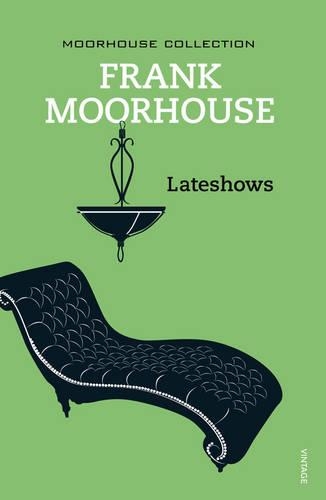
Lateshows
(Paperback)
Publishing Details
Lateshows
By (Author) Frank Moorhouse
Random House Australia
Vintage (Australia)
2nd February 2009
Australia
Classifications
General
Fiction
A823.3
Physical Properties
Paperback
264
Width 131mm, Height 200mm, Spine 20mm
238g
Description
Our Hero explores contemporary protocols - of family, food and art - looks at the tragic evanescence of technology and investigates meal reform and the science of life. The Club - I also thought I moved with what was called the Fast Crowd but I have begun to face up to the slowing of the Fast Crowd. My friends now not only move with a more leisurely pace, I observe, but with an undignified lack of urgency, are slower to rise from their chairs, and also, I have noticed, they have begun to procreate. The Late Family had arrived in my life. For some of my friends the Late Family had replaced the Late Show. The Movie - This is a story about how the flow of life is made into stories, how stories become films, how the making of stories and films itself becomes stories, and how stories become the flow of life. The Caberet Voltaire - It occurs to me that the telephone answering machine is something of a wall, albeit a friendly wall. Robert Frost's neighbour says that good fences make good neighbours. Good greetings on a telephone answering machine make good telephone neighbours. But as Frost says, 'Something there is that doesn't love a wall, That wants it down.' I suppose some people do not like the wall to joke. There will always be those types. The telephone answering machine could be seen as the dog Cerberus barking at the gates of Hades. The dog Cerberus didn't stop people coming into Hades - he stopped people going out. The telephone answering machine is Cerberus trying to prevent the people who come down the dark tunnel of the telephone from getting away. It holds them by their voice, seizes them by their throat.
Author Bio
Frank Moorhouse was born in the coastal town of Nowra. He worked as an editor of small-town newspapers and as an administrator but in the 1970s became a full-time writer. He has written twelve books of fiction and one non-fiction book. He has won a number of literary prizes including the Australian Literature Society's Gold Medal for 1989. Forty-Seventeen was given a laudatory full-page review by Angela Carter in the New York Times and was named Book of the Year by The Age and 'moral winner' of the Booker Prize by the London magazine Blitz. Grand Days, the first of the Palais des Nations novels, won the SA Premier's Award for Fiction. Dark Palace won the 2001 Miles Franklin Literary Award and was shortlisted for the NSW Premier's Literary Award, the Victorian Premier's Literary Award and the Age Book of the Year Award.
